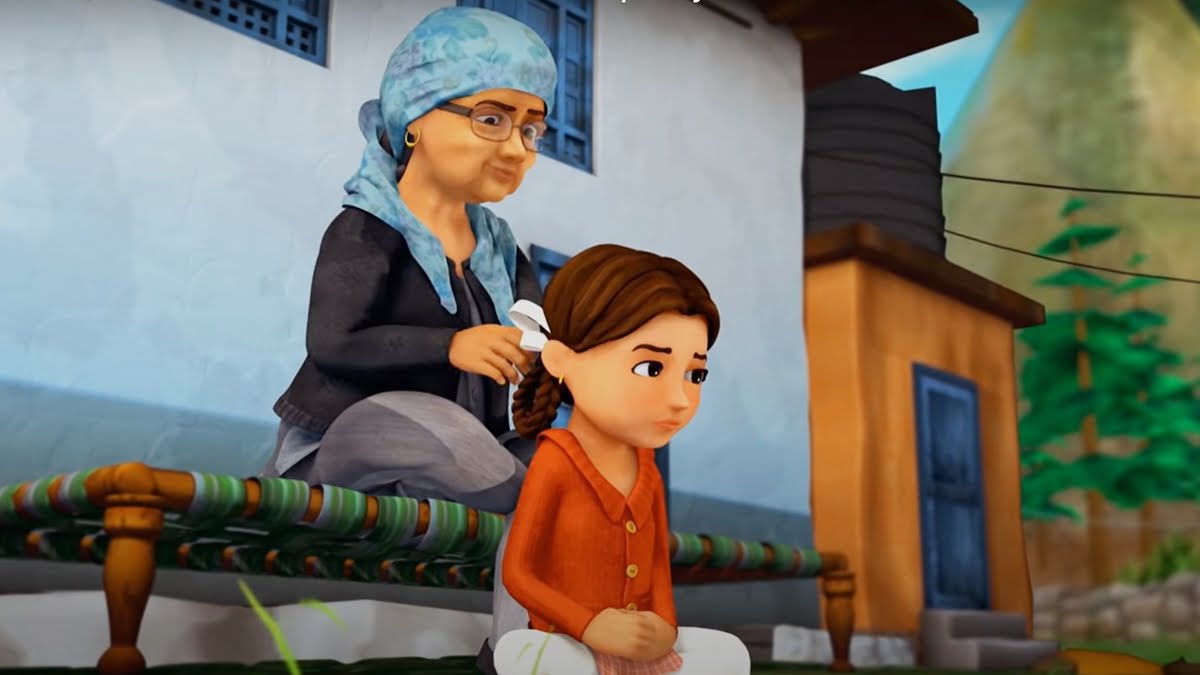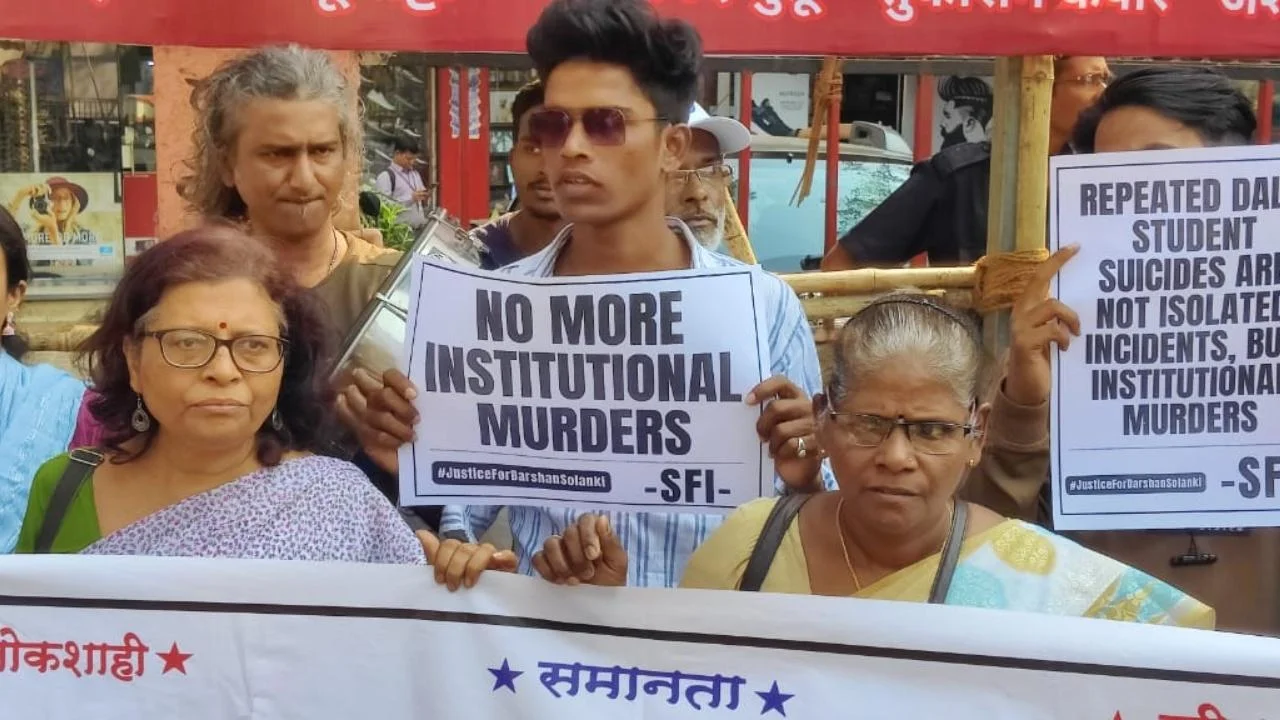Considering how interesting at the same time highly impactful animation as a medium is, Muskaan in this regard is no exception. This film deftly puts across a very thought-provoking message in a lucid ‘story-telling’ fashion within just 20 minutes. Directed by Avinash Medhe, one of the founders of Girgit Studios, it was featured on March 8, 2017 in Shimla as an initiative of the Directorate of Women and Child Development, Himachal Pradesh.
Shedding some light on the backdrop, Muskaan showcases the rural landscape fraught with stereotypical mental backwardness and highlights different sets of characters embodying the various mindsets commonly manifested in society. It points out the rigidity of cultural dogmas predominantly associated with the obsession over male hierarchy and aims to dismantle the gender prejudices rampant in several pockets of our country. Muskaan attempts a strong commentary on practices of sex determination of the foetus and the desire for a male child.
Muskaan points out the rigidity of cultural dogmas predominantly associated with the obsession over male hierarchy and aims to dismantle the gender prejudices rampant in several pockets of our country. It attempts a strong commentary on practices of sex determination of the foetus and the desire for a male child.
Also read: Hayao Miyazaki And Studio Ghibli’s Cinematic Representation Of Empowered Women
The story takes a significant turn on the night Muskaan, the bubbly, dauntless little protagonist, accidentaly overhears her grandmother ‘ordering’ her pregnant mother to indulge into the illicit practice of sex determination and undergo abortion if the baby happened to be a girl, reinforcing the widespread prevalence of stereotypes even today which furthers the discriminatory attitude that a woman has to face every now and then, on myriads of occasions. Though at first Muskaan’s innocence fails to comprehend the reason behind the instruction, as soon as she learns from her mother the gravity of the heinous act, she rebelled against her other family members and embarked on the challenge to prove to her grandmother that girls are in no means less than their male counterparts. Muskaan is accompanied by Tunnu, a timid boy who ends up overcoming his trepidations and is supportive of his friend’s endeavors.
Muskaan’s dadi is the projected antagonist in the story who harbours conventional ethics and reflects an orthodox disposition. She being the eldest member exerts her dominance in the family and expects others to adhere to the patriarchal norms that she resolutely propagates. Muskaan’s dadi fails to recognise and understand that she herself has been traditionally at the receiving end of male subjugation, such that she perpetuates this hierarchy by quite unthinkingly subjecting her daughter-in-law to a similar state of oppression. Come to think about it, the antagonist in Muskaan is the patriarchal conditioning, so deeply entrenched, that it turns our loved ones against us. Women like Muskaan’s dadi portray how they act like the gatekeepers of patriarchy by manipulating others to go against the well being of their own kin and curb their own rights to freedom.
Come to think about it, the antagonist in Muskaan is the patriarchal conditioning, so deeply entrenched, that it turns our loved ones against us.
In this case, dadi exercised her stronghold on Sarita, Muskaan’s mother, taking advantage of her docility. Sarita is denied her autonomy to make choices about her own body and the future of the child she is bearing. She is unable to articulate herself freely before Manoj, her husband, portrayed as the primary bread-winner of the family, who is more obliged to his mother’s commands in all the household matters. She seems to represent a plight naturally faced by homemakers, who due to a dearth of financial independence are devoid of an agency. While travelling in the car headed to the clinic, Muskaan’s mother establishes the concept of unquantifiable and unpaid domestic labour perpetrated under the overarching patriarchal setup since time immemorial. This drives home the idea of ‘economic burden’ widely identified with a girl child, in turn perpetuating practices such as the dowry system, female infanticide, among others.
Ranjana’s mother, a neighbour of Muskaan, succumbs to some of these irrational beliefs and displays a perpetual apprehension about her adult daughter’s safety and security especially heightened by her delayed return at night. (Most of us must be well-acquainted with such unsolicited doles of advice given out to us in the name of our well being like, “Don’t stay out too late in the night”, “Your dress is too short or tight!”, “Let your brother/father/uncle drop you to your destination” and the list can go on and on). Just like many other Indian women, she too perceives her daughter to be nothing more than a mere liability and is convinced that marrying her off can save her from the threat of male gaze looming large on every woman in this society.
On the flip side, Muskaan’s uncle, Rajesh is apparently a well-informed man, full of empathy and a passive advocate of women’s achievements and abilities. His character proves that the proclivity of a patriarchal tyrant is not gender specific. It is a ‘choice’ to be sensible or an oppressor. Hence it can be fought by anybody and a resistance can be built up anytime awareness dawns on us.
Last but not the least, the chameleon in Muskaan occupies a significant role. It is seen to depict human-like emotions indicated by a change in colour when it feels captivated by the playful children. It resembles the despair human beings experience when they are clamped down due to prohibitions imposed on them by the whims and fancies of a powerful entity in society. It switches to another colour as soon as its freedom is restored portraying how important it is to grant one’s desired space to express oneself to the fullest. Likewise women in particular can prosper and shine on if they are freed from the unreasonable shackles of patriarchal subjugation.
Eventually, dadi realises her wrongdoing in the end when Sarita courageously condemns female foeticide. There occurs a metamorphosis in her outlook when Muskaan’s principal enlightens her on the potentialities of her granddaughter and acknowledges her for the strength that Muskaan exhibits. Subsequently she voices her protest against the doctor’s malpractices and threatens to inform the law if they don’t stop. Despite the positive turn Muskaan takes, the ending still manages to tear up the viewers a bit.
Also read: 5 Of Our Favourite Feminists In The World Of Animation
A film dealing with such a pertinent issue at hand should not be confined to Hindi alone and need to be made accessible in other languages too. “Amma puchhdi sun dhiye meriye…” is a Himachali song in the movie which perfectly captured the day to day sentiments and practices and manages to give the film an earthy flavour, especially because of the local dialect it was sung in. However, Muskaan could imply how such malpractices are prevalent only in the villages or remote areas of India, thus generating a skewered representation of the reality of gender injustices widely existent across rural and urban spaces.
While there have been prominent strides undertaken in the past few decades, the question arises as to how successful were they in attaining gender equality taking into account the present dismal sex-ratio of our country? Have the government laws been effective in putting an end to grave crimes pertaining to sex-selective abortions, dowry system, rapes and molestations? The answer is in the negative. A considerable amount of onus lies on us as well to ensure a full-fledged triumph of the government’s “Beti Padhao, Beti Bachao” campaign. It’s high time we contemplate ways and means to lay the foundations for a more equitable, just and gender-inclusive world.
Sutirtha Mazumdar is currently pursuing Masters in History from Jadavpur University. Her research interest lies in Global Diplomacy, Climate Change, Gender, Feminism, Child rights, Marginalised Communities, Modern and World History. She interned with Nepal Institute for International Cooperation and Engagement (NIICE), a think tank. She has participated in the Model United Nations (MUNs) held in Kolkata and in other cities. She has been a part of two consecutive editions in organizing Jadavpur University Women’s conclave, a national level academic event. She is a singer and has won competitions in the university and state level. She can be found on Facebook and Instagram.
With a 5+ years experience in the field of humanitarian service, Deblina Chatterjee is following her passion to be a change maker in the society. She is currently pursuing her dream as a Community Mobilizer for Anahat for Change Foundation. She can be found on Facebook and Instagram
Sutirtha and Deblina are grateful to Maitrayee Mukherjee, a student of Comparative Literature in Jadavpur University and intern with Rangeen Khidki Foundation (RKF) for her support in writing this article.
Featured Image Source: YouTube




